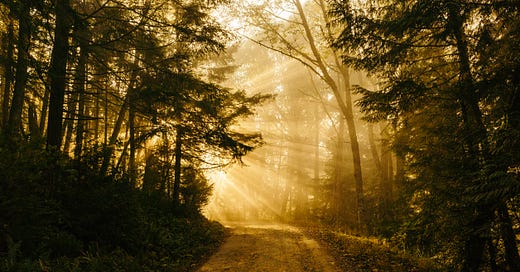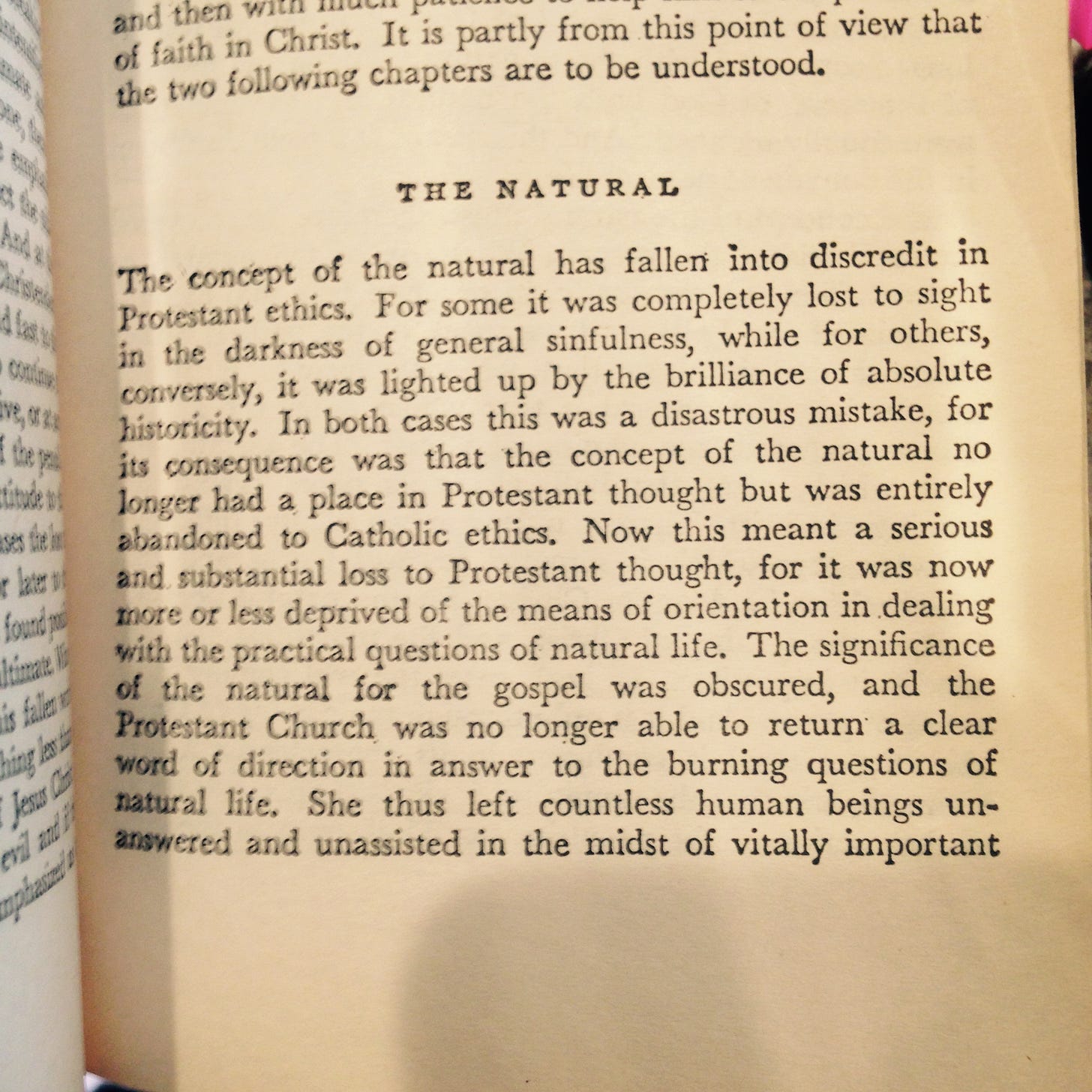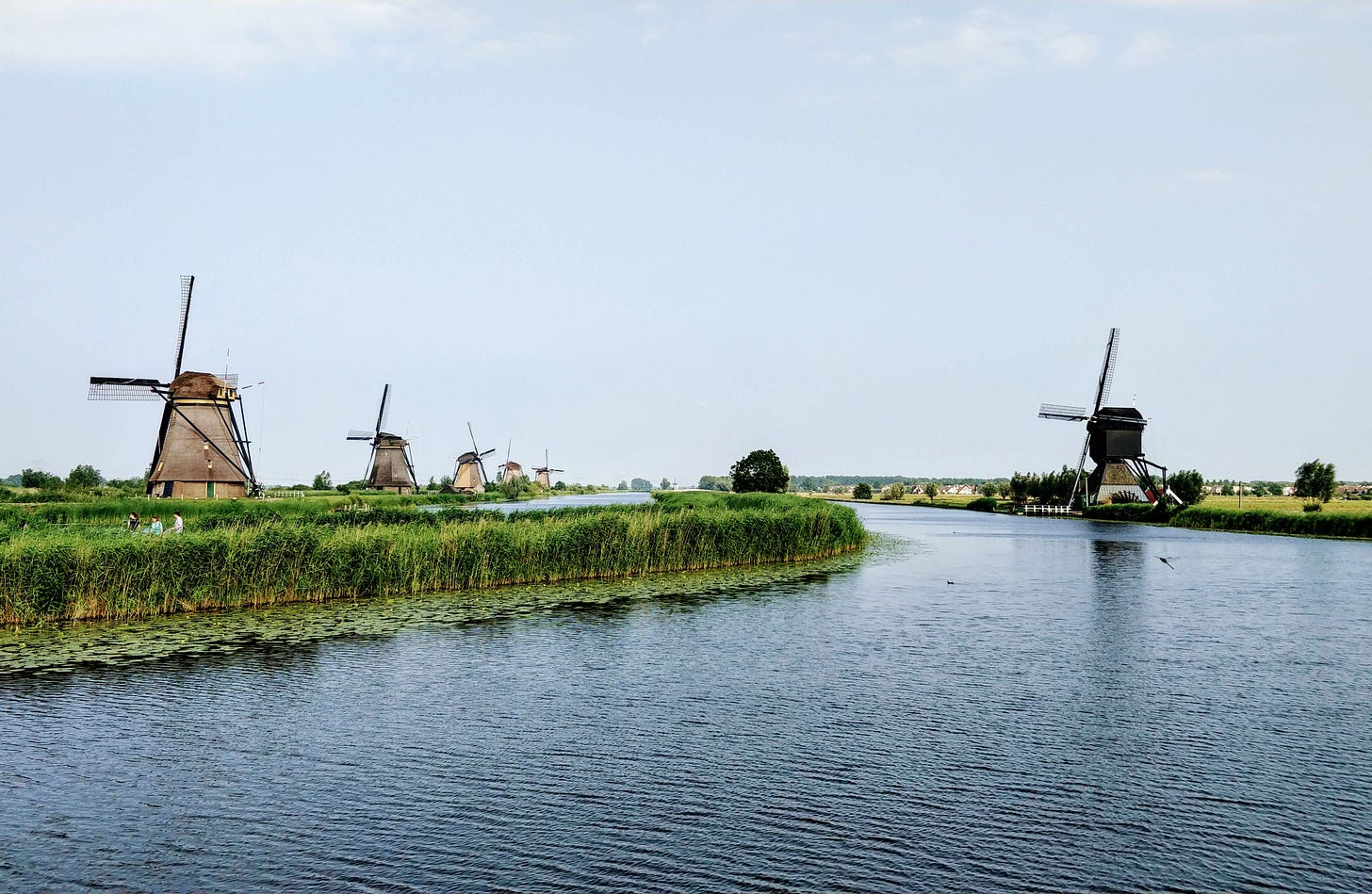Common Grace, Nature, and Our Most Fundamental Identity
In Which I Find Common Ground Between Christian Nationalists and “Side B,” Celibate, Gay Christianity
In conjunction with my writing on common grace and Christian coherentism, I am making available an eBook on the strictest form of Christian coherentism, titled, “50 Errors of Christian Presuppositionalism.”
My inquiry into the common grace vs. nature discussion finds me uniting camps that might be thought quite opposed to one another. On the one hand, my interrogation of the doctrine of common grace was inspired by Aaron Renn’s reaction to the debate surrounding Stephen Wolfe’s The Case for Christian Nationalism. On the other hand, in response to Kevin DeYoung’s tweet, “Our most fundamental identity is that we are sinners in need of a Savior,” Revoice founder Nate Collins said, “White [North American] evangelicalism as a whole tends to operate with a Fall/New Creation anthropology.”

While the DeYoung tweet was merely taken by an assistant from a sermon in which it may have had more clarity, the language of “identity” invited objection. Many urged mention of the image of God as more fundamental, including many folks in the Side B discussion. Among these, Lamont English wrote, “I really don’t like that the PCA’s membership vows begin with a Genesis 3 framework. I wish it started with a Genesis 1 framework.” In response, Collins cited a purportedly predominant Fall/New Creation anthropology as the source of this theological emphasis.
My inquiry into the common grace vs. nature discussion finds me uniting camps that might be thought quite opposed to one another.
Based on English’s and Collins’ words, I surmise that they are talking about an anthropology based on leaving creation out of the framework of “creation, fall, redemption/new creation.” This would be an anthropology that views creation or nature as all but obliterated by the fall, something we have discussed as Common Grace Theology. On this perspective, we are nothing but fallen sinners; all that is good comes from the work of new creation. If anything good occurs outside the realm of new creation, it must be attributed to “common grace.”
Of course, it is impossible to accuse Kevin DeYoung or most any other Christian of denying the doctrine of creation. Obviously, a new creation presupposes an original creation. But a certain framing that gives prominence to the fall ends up underselling the created order.
And in different ways, both proponents of Side B and of Christian Nationalism have appealed recently for a stronger theology of nature and the created order.
1. Does Nature Need a Biblical Defense?
Now, over the weekend, I was encouraged (by one of my readers) to ground any defense of common ground between believers and unbelievers in the Noahic covenant (following David VanDrunen), and to prefer the language of “creation order” to that of “nature.” However, as I see it, to do so would concede too much. To begin with, I do not believe that the idea of natural or creation order is ultimately grounded in a covenant, nor even that it must be justified from Scripture. I believe it is attested to in Scripture, but, in being the natural order, it can be plainly seen in the things that have been made - in fact, it is the things that have been made. The existence of nature does not stand in need of biblical defense.
It was Abraham Kuyper who pioneered the linguistic switch from “nature” to “creation order,” as I read in David VanDrunen’s Natural Law and the Two Kingdoms. Given that the polemical and cultural context had shifted compared to earlier Reformed theologians, Kuyper and others felt discomfort with the category of “nature.” It felt too secular and too much the property of Darwinian science. “Creation order” appeared a more biblical way to speak about the order of things in the world.
The idea of natural or creation order is not ultimately grounded in a covenant, nor must it be justified from Scripture. The existence of nature does not stand in need of biblical defense.
Strikingly, Dietrich Bonhoeffer actually argues for the use of the category of “nature” because it is about the world in its current, fallen condition. While in the schema of Creation, Fall, and Redemption, “Creation” appears to hold the place of the prelapsarian state of integrity, “nature” refers to something that was created and so existed before the fall, but also continues to exist after the fall. In fact, “creation order” might itself be ambiguous between reflecting original righteousness and the state of integrity which were lost and left by virtue of the fall. “Creation ordinances” is a bit clearer as a reference to marriage and work, aspects of the created order that persist after the fall. (Creation ordinances have prominence both in Bonhoeffer and Brunner and in a more biblicist Reformed theologian like John Murray.)
In Bonhoeffer’s apology for nature in Protestant theology, something about which I have tweeted but not written, what is at stake is that Christians be able to see and recognize the goodness of creation even as “natural,” as fallen. Therefore, an affirmation of the “created order” that is not an affirmation of nature is insufficient. It will be purely theoretical. It allows for a sort of Puritanism according to which the created order is something purely ideal and moral.
Rather, nature is the stuff that is all around us. Nature continues to show forth its divine origin, including its past, integral state, since lost, even as its fallenness and brokenness are apparent.
In reading VanDrunen, I was surprised that some - namely Jeremy Begbie - have criticized Kuyper’s doctrine of common grace for being too much of an acknowledgment of commonality and of a natural order. Begbie, following Barth, truly wants everything to be grounded in Christ, redemption. And indeed, Barth’s is the most complete denial of nature. But Kuyperianism, especially as funneled through Cornelius Van Til, practically ends up there.
From what I read, Kuyper seems like a contradiction. He fully articulates the antithesis and a kind of idealism - worldviews being sealed off from each other. But he also is fully against theonomy and recognizes the natural order, prudence, etc. Consider this quote, in stark opposition to the theonomy that Rushdoony and Bahnsen would propound in his name:
We contradict the argument that Holy Scripture should be seen as the source from which a knowledge of the best civil laws flows. The supporters of this position talk as though after the Fall nature, human life, and history have ceased being a revelation of God and as though, with the closing of this book, another book, called Holy Scriptures, was opened for us. Calvinism has never defended this untenable position and will never acknowledge it as its own.… We have refuted the notion that we entertain the foolish effort to patch together civil laws from Bible texts, and we have declared unconditionally that psychology, ethnology, history and statistics are also for us givens which, by the light of God’s Word, must determine the standards for state polity.
(“Christian empiricism,” anyone?)
Kuyper’s rejection of theonomy reminds me of another thing he gets absolutely right, that I learned from him. In Kuyper’s Lectures on Calvinism, Kuyper clearly distinguishes the philosophy of life that arises from the Radical Reformation (Anabaptism) and that of the magisterial Reformation. It is the Anabaptists who abandon the realm of the secular and natural and argue that grace is opposed to nature. Meanwhile, the Reformed had left behind a Catholicism that also found the realm of the secular and natural unholy, however necessary. By contrast, the Reformed position was the most strongly affirmative of the natural, created order.
My series on common grace began with the claim that “common grace” was a twentieth-century innovation. With the revision that Kuyper first wrote on common grace in the decade before the turn of the century, I stand by the claim that “common grace” is a theological innovation. For Kuyper, it was a polemical response to the realm of nature being taken over by secularism, Darwinism, and atheism, while attempting to maintain the classical Reformed and classical Christian affirmation of the natural. But it was the wrong polemical response, a retreat and a step toward Barthianism.
2. The Theology of Nature and Side B
In all of this discussion, I think it is clear I don’t believe any of this - whether to say “common grace,” “nature,” or “creation” - is just words. Nor are they simply “concepts.” Each word represents some real principle of the world, with true explanatory power.
What is more, I think a recognition in theology of nature and experience (empirical knowledge) give an important foundation to theology and Christian thought that crosses political and ideological boundaries. So far, it unites Stephen Wolfe of In Defense of Christian Nationalism and Nate Collins, founder of Revoice. (I suppose it doesn’t unite them, but I, at least, see a common thread.)
In fact, recognition of nature and experience would do wonders for the debate surrounding same-sex attraction. Following my initial foray into that debate, I sat down with Grant Hartley, a proponent of Side B, and a bit of a player in the controversy, as his 2018 talk “Redeeming Queer Culture” was a locus of conservative concern about the direction of Revoice. Over the course of our discussion, Grant expressed an inclination toward postmodernism, something I can understand given his polemical context. Such an approach would downplay the idea of what is natural and given in favor of recognizing how much is socially constructed. However, I would urge, as I described to Grant, a realist and empiricist approach as a viable philosophical foundation for Side B.
One of the problems with the “Side Y” view, the view that the phrase “gay Christian” should be avoided and that being same-sex attracted is something of which one must repent, is that it insufficiently accommodates knowledge from experience. It certainly seems airtight and biblical with its concern for doctrinal purity. However, if you introduce a premise from experience, “Some individuals are attracted to the same sex and do not experience any change in this orientation over the course of Christian discipleship,” the formulation seems to fail. After all, we have to have some word for the psychological trait of a persistent pattern of sexual attraction, and the language of sexual orientation is difficult to fault.
I would urge a realist and empiricist approach as a viable philosophical foundation for Side B.
As we discussed, nature as a theological category does not refer to flawless, prelapsarian conditions, but to the stuff of reality all around us, the product of divine design but under conditions of sin and misery. This means that a recognition of the reality of sexual orientation can be a recognition of something in nature, something which might be studied empirically by psychologists, or simply encountered in personal experience. This is, in fact, what I think it is.
However, while Side B tends to accord parallel treatment to “being gay” as to “being trans,” an empirical approach would point to a distinction between the two. Here, the source of my experience is largely the media of the UK-based LGB Alliance. The non-Christian, gay-affirming LGB Alliance is the sort of place Christians should look as they consider the transgender issue.
In short, the message of the LGB Alliance is that transgenderism is conversion therapy for gays, to make them straight. The stories of detransitioners and desisters heard in their videos frequently include the individual being uncomfortable with being gay or the parents of a child being uncomfortable with the child being gay. In these contexts, switching sex seems to provide a solution, because in doing so, one also purportedly reverses one’s sexual orientation.
What is striking is that a failure to acknowledge the reality of homosexual sexual orientation is actually a cause of transgenderism.
Of course, the other piece of the puzzle is that transgenderism itself involves a denial of reality. The human condition is sexuate. Homo sapiens is sexually dimorphic as a species. It is not possible to change one’s sex. The things it is possible to change, like one’s physical appearance, whether surgically or cosmetically, are nothing more than appearance. They certainly do not amount to some tertium quid called “gender.” (“Gender” is just a euphemism for biological sex.)
This means that there is room for a Christian approach to homosexuality and transgenderism that is unified not by partisanship but by a basis in empirical knowledge and recognition of nature. A proper Christian response to homosexuality and transgenderism cannot be doctrinally self-enclosed but must recognize the reality, in fallen nature, of homosexual sexual orientation.
3. Our Fundamental Identity
Let’s return to Kevin DeYoung’s tweet and the Side B response to it: “Our fundamental identity is that we are sinners in need of a Savior.”
My first recommendation is that we drop the language of “identity.” It has always bugged me. This includes the doctrine that we should “find our identity in Christ.” All of this seems to involve a “self ID” view of anthropology, that identities are something we assume, take up, or choose.
We should settle for the description of our nature. What are we? And a Christian account will follow directly from our theology, which is not merely a “Fall/New Creation” theology. It is a theology of creation, fall, and redemption. Our good, created nature is the first and most fundamental thing. Sin and evil are accidental, a privation of a fundamentally good creation. And the redemptive grace of God is at work in our nature, renewing us after the image of God.
Therefore, our fundamental nature as Christians is neither being sinners nor being gay or straight. Our fundamental nature is that we are humans, made in the image of God. This should unite us all.
What is more, being Christian isn’t our fundamental identity either, permitting no adjectives. A same-sex attracted Christian is a human, made in the image of God, fallen and therefore sinful and suffering, in particular experiencing same-sex attraction, but redeemed and saved by grace through the death and resurrection of Christ. The phrase “Gay Christian” says a couple of these things, and there is nothing wrong with it on that level.
Our fundamental nature as Christians is neither being sinners nor being gay or straight. Our fundamental nature is that we are humans, made in the image of God.
As I survey these debates, there are simply a lot of bad arguments made as people try to ward off one heresy or another, thereby protecting the heresy to which they themselves are more inclined. If we stuck to articulating accurately the fullness of Christian theology and philosophy, we would find ourselves in a better place, united around the truth and around he who is the Truth.









I am just over 2 years late to this article. And I really enjoyed reading it, returning from your latest article at American Reformer.
Reading, I came across this from your article "(Gender” is just a euphemism for biological sex.)" Is this something you maintain or have you changed your views since then?
I am especially curious because I am thinking through the issues of gender, Mammon, and the death of Eros and how they are all might be connected at the moment. And the issue of gender seems to be the most tenuous.
Because while we cannot deny the dimorphic nature of the sexes, the cultural interpretation of the same throws a tiny spanner in the wheel.
So, if it isn't any trouble, what are your current thoughts and pointers? Thank you.